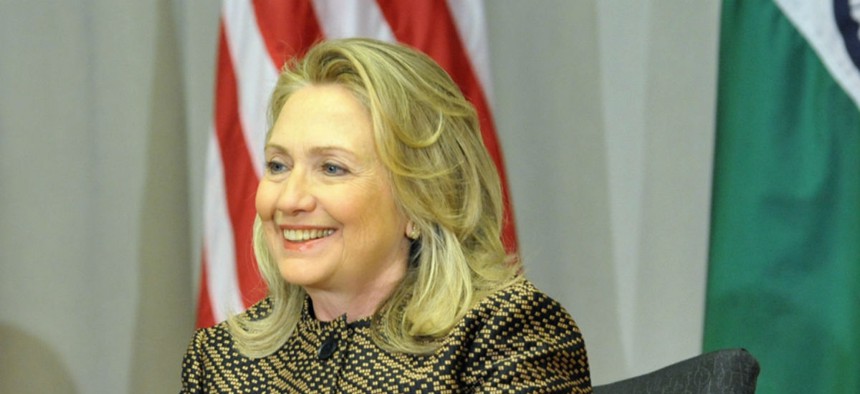
State Department file photo
Archives Officials Worried Clinton Might Send Records to Little Rock
Chief records officer disputes legal group’s interpretation of 2012 emails.
Newly obtained internal emails from the National Archives and Records Administration suggest that its top officials were concerned as far back as December 2012 that then Secretary of State Hillary Clinton would divert her official records to the Clinton Presidential Library in Little Rock, Ark.
Exchanges obtained by the legal nonprofit Cause of Action through public records requests to Archives and the State Department appear to show that Paul Wester, the Archives’ chief records officer, notified then-Chief Operations Officer Tom Mills and Executive for Agency Services Jay Trainer of his concern.
One Wester email reads, “Tom heard (or thought he heard) from the Clinton Library Director that there are or may be plans afoot for taking her [Mrs. Clinton’s] records from State to Little Rock.”
According to a Cause of Action release, Wester said NARA needed “to make sure everyone leaving the administration does not leave with federal records,” adding that NARA was “aware of the issue and are working on it.”
The documents show that Mills and Trainer “continued to invoke the specter of the Henry Kissinger experience vis-à-vis Hillary Clinton,” an allusion to a years-long battle over telephone records with the secretary of State under presidents Nixon and Ford.
Clinton, now a candidate for president, this week declared that she is eager for the State Department to accelerate its review of the thousands of emails she returned to officials from her home-based server, so that they may be made public. Another set of her emails is being reviewed by the House Select Committee on Benghazi.
Cause of Action suggests that Archives official Wester may not have been fully transparent when, this February, just before the controversy over Clinton’s use of personal email for business surfaced, he wrote to a congressional staffer that “the State Department records management program and staff are considered very strong. NARA has awarded the State Department two Archivist Achievement Awards in Records Management in the past decade.”
Asked to respond, Wester told Government Executive on Thursday that Archives officials were concerned about Clinton’s broader, textual records, not her email. “In December 2012, we had no concerns about Hillary Clinton’s emails,” he said, noting that the fact that she used a private email server for official emails was revealed only this March by The New York Times. “I was conveying to my staff my concern about what we’d heard [about the Clinton library] while trying to set the stage for the ongoing work we do in our unit on making sure that we have the right kinds of publications for agencies during transitions.”
The Archives had “larger concerns about moving her records,” he said. His staff knew that the State Department “had a program like all agencies to deal with the transition, so our concern was not very high,” he said. The Archives’ view of State’s handling of the records “was based on day-to-day interactions” with staff on their ability to identify and schedule the transfer of records, and on the self-assessments of records compliance that all agencies provide, he added. “As a practical matter, the National Archives does not have the ability or jurisdiction to look at what agencies do with their every-day records.”
Cause of Action Executive Director Dan Epstein in a statement said, “These records reveal that before Hillary Clinton exited the State Department, there were serious concerns about her violating federal records laws. Yet, despite knowledge by the State Department and the Archives, nothing was done about it.” Without transparency groups such as his, Epstein continued, the public would never get the full story.







